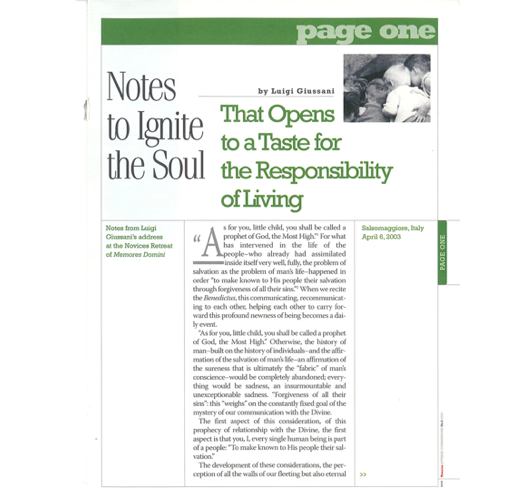
Notes to Ignite the Soul That Opens to a Taste for the Responsibility of Living
Notes from Luigi Giussani’s address at the Novices Retreat of Memores Domini.“As for you, little child, you shall be called a prophet of God, the Most High.”1 For what has intervened in the life of the people–who already had assimilated inside itself very well, fully, the problem of salvation as the problem of man’s life–happened in order “to make known to His people their salvation through forgiveness of all their sins.”2 When we recite the Benedictus, this communicating, recommunicating to each other, helping each other to carry forward this profound newness of being becomes a daily event.
“As for you, little child, you shall be called a prophet of God, the Most High.” Otherwise, the history of man–built on the history of individuals–and the affirmation of the salvation of man’s life–an affirmation of the sureness that is ultimately the “fabric” of man’s conscience–would be completely abandoned; everything would be sadness, an insurmountable and unexceptionable sadness. “Forgiveness of all their sins”: this “weighs” on the constantly fixed goal of the mystery of our communication with the Divine.
The first aspect of this consideration, of this prophecy of relationship with the Divine, the first aspect is that you, I, every single human being is part of a people: “To make known to His people their salvation.”
The development of these considerations, the perception of all the walls of our fleeting but also eternal reality, is enacted and presented–to anyone who has taken the human journey into consideration–as creating a people: it is sharing the same heart, it is an impulse of decisive foresight. What a great thing this event is, the event of Christ, and the event of “children” who are made prophets of the Most High! And so everything, in them and by them, through them, constructs and constitutes the presence of a people, of a human people, in the justification of errors.
There is a keenness of the Eternal, there is an impulse that the Eternal holds out to the heart of man (not as God did at Meribah, with Israel, at Massah in the desert3). There is something, there is something… here it is that slowly our heart is moved to open our eyes, to open our eyes wide, to make our eyes open wide in front of the inconceivable, inconceivably beautiful, totally good aspect of what God did with Our Lady, what God did with His mother.
Therefore, when we say the Hail Mary before we eat, at our noon or evening meal, we acknowledge in Our Lady the first vibration of the strings of this musical instrument that is the reality of God for all the angels and for every man who says, “Father, who are in heaven, in the depths of all things…” Our Lady!
“ As for you, little child, you shall be called a prophet of God, the Most High.” Perhaps we have become familiar with the figure of Our Lady as the first-born of everything that happens. It is the figure of Our Lady, it is the reality of Our Lady–of whom it is said that she is the locus of mercy, the locus of pardon and magnificence, the locus of true and magnificent reality4–that pushes on man’s doors in every instant.
“ As for you, little child, [that is to say: I, you] you shall be called a prophet of God, the Most High.” And who is it who takes into consideration any piece whatsoever of my life, every single moment (including the moment when frailty or malice, penetrating into the innards of time of my history, was still not able to impede the announcement of His Presence: “As for you, little child, you shall be called a prophet of God, the Most High”)? This creature, this woman! A woman who walks 70 miles of road to go see her cousin, St Elizabeth.
Let us entreat this mother, then, because this is how the great Designer of the world made her. As time passes, let us not raise objections, let us not try to hinder our relationship with her figure, her reality, her reality present in the mystery of things, present in the heart of being in action! Veni Sante Spiritus, veni per Mariam: let us surrender with serenity, with the certainty of Moses, and before Moses, of Abraham, and of the sons of God who were born of man. Devotion to Our Lady must take away, can take away, every fear and every irritation of hastiness.
In the Benedictus every day, let us remember this woman’s invading–invasive and invading–and great part, so great and so valuable that for “anyone who seeks grace” and does not stop to invoke her, “his desire” would be futile, like one who tried to “fly without wings.”5 That is to say, “You are the wings of my heart.”
Thank you for this opportunity.